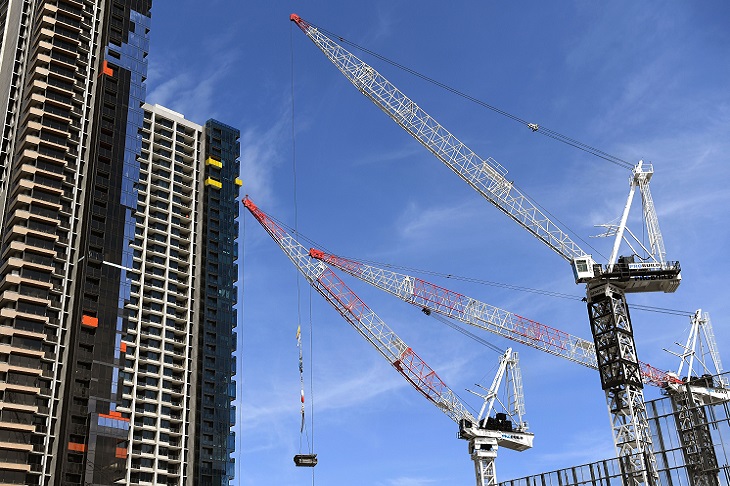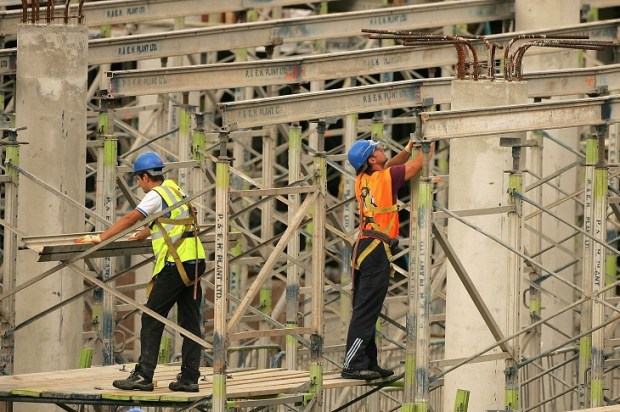Amidst Anthony Albanese’s confusing election promises, there’s one commitment that stands out. An Albanese Labor government will close down the Australian Building and Construction Commission (ABCC).
For most Australians, this will mean very little. The ABCC can seem obscure or fail to resonate with everyday lives. But to the construction unions – particularly the high-profile CFMEU – the ABCC is a despised enemy. Over roughly the last two years, the ABCC has successfully prosecuted construction unions (and mostly the CFMEU), with fines imposed totalling $5.7 million.
It’s helpful to understand why an Albanese government shutdown of the ABCC is a high priority for the Labor movement.
The ABCC was a long-term ambition of the Coalition following the 2003 Cole Royal Commission into lawlessness in the building and construction industry.
The current version of the ABCC was established in December 2016 under Coalition Prime Minister Malcolm Turnbull. Its broad legislative remit is to bring the rule of law to the commercial construction sector. It has jurisdiction over any commercial construction work funded or partly-funded by the Commonwealth.
Essentially, the commercial construction sector operates along mafia-like principles protected by political patronage. The construction unions – principally the CFMEU, Electrical Trades Union, and AMWU (metal workers) – seek to (and mostly do) control construction worksites through such things as stopping concrete pours and other ‘industrial’ activity. Where they feel inclined, they have been accused of resorting to thuggery and violence. This was evidenced in the 2003 Royal Commission inquiry.
Overlaying this basic level of mafia-style activity is something far more sophisticated. Union activity serves the purposes of large construction firms to limit competition. Top-tier construction firms rarely have workers who work on the tools on-site. They are managers of contracts and make their money creaming off a percentage of any job. The ‘trick’ for the top-tier operators is to push risk down the contract chain.
An additional ‘trick’ is to prevent any of the lower-level firms from becoming competitive against the top firms. Unions do this for them. The top construction firms have ‘productive relationships’ with unions. If a lower-level firm becomes too good or competitive, union activity can keep them in their ‘lower’ place.
This anti-competitive ‘trick’ of the system is something carefully hidden from the public, but those ‘inside’ the system may recognise it.
What’s more obvious is the political patronage. This comes through unions funding the Labor Party (obviously), but more significantly, through construction firms needing to ensure that they also part with money that feeds the Labor machine, including the ALP. This can take the form of direct payments, but the big dollars are funnelled indirectly through jobs, favourable contract placements, and so on. What makes it so sophisticated is that it’s all perfectly legal and ‘upfront’.
Obviously, this is a highly simplified description of how the construction ‘mafia’ system operates in Australia. The tracking of the complexities of the processes were exposed to some extent in the 2003 Royal Commission Report. The ABCC is the Coalition’s primary response.
Under its statutory obligations, what the ABCC mainly focuses on is the ‘glue’ that holds the mafia-style process together. That is, the use of intimidation, threats, violence, and thuggery to stop work on construction sites. The ABCC is limited, however, by its jurisdictional reach to Commonwealth-funded projects. Wholly-funded state government and private-sector projects are outside the ABCC’s reach.
Even with this limitation the ABCC’s activity enrages the construction unions, who in return receive robust support from the Australian Council of Trade Unions and in turn from the Labor Party. The Labor movement in all its forms sees the existence and operations of the ABCC as a direct threat to its power and funding.
The ABCC does do more that ought to be above party politics. It operates a Security of Payments system in the construction sector. It’s a vital service. All construction firms within the ABCC’s jurisdiction are required to pay their subcontractors within payment terms. If they are late, they must report this to the ABCC. Subcontractors can lodge complaints with the ABCC over late payment.
If contractors do not pay on time, they risk sanctions that ultimately include being banned from all Commonwealth-funded work. Over around the last 5 years, the ABCC has recovered some $10.7 million in outstanding payments owed to subcontractors. Major contractors have been disciplined.
An external review of the ABCC reports a ‘reduction in the number of delayed payments’ and ‘greater efforts being made to pay subcontractors on time’. This is critically important.
The construction sector has a long history of major companies collapsing, leaving subcontractors with massive unpaid debts which in turn lead to cascading losses to the smallest subcontractors. Imposing discipline so that subcontractors are only exposed to losses within their trading terms limits the damage that can occur from top-tier company collapses.
There’s no doubt that should Anthony Albanese’s Labor win the election one of its highest priorities will be the elimination of the ABCC. The outcome would be renewed, unrestrained thuggery on construction sites. Further, small business tradie subcontractors would again carry the risk of not being paid. A bad outcome for all except for the thugs.
Ken Phillips is Executive Director of Self Employed Australia
(Disclosure: Ken Phillips is a member of the ABCC Security of Payments Working Group along with representatives from the ACTU and Building Industry Associations.)
Got something to add? Join the discussion and comment below.
Get 10 issues for just $10
Subscribe to The Spectator Australia today for the next 10 magazine issues, plus full online access, for just $10.


























Comments
Don't miss out
Join the conversation with other Spectator Australia readers. Subscribe to leave a comment.
SUBSCRIBEAlready a subscriber? Log in